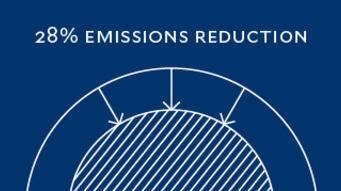Climate Action
Taking Action in a Changing Climate
Yale is committed to achieving zero actual carbon emissions by 2050 with an interim goal to reach net zero emissions by 2035. Net zero will be attained primarily by reducing campus emissions 65% below 2015 levels and, as needed, retiring high-quality, verifiable carbon offsets. Zero actual carbon emissions will be accomplished by fully minimizing campus emissions and deploying clean energy technology.
Our approach to climate action is university-wide. We are expanding Yale’s teaching and learning opportunities to address the complexity and scale of global climate challenges, investing in our campus infrastructure and emerging technologies to reduce our impact, and have adopted fossil fuel investment principles to help facilitate a shift toward a decarbonized energy future.
Yale’s Efforts
- We strive for responsible energy use through conservation, efficiency upgrades, and creative approaches to campus use.
- We work to ensure that energy generation on campus is as efficient and clean as possible.
- Our greenhouse gas emissions reduction strategy steadily moves us toward our zero emissions targets.
- We are purchasing and retiring high-quality, verified carbon offsets to meet our emissions goals when necessary.
What You Can Do
- The Yale Carbon Charge is testing how price signals impact behavior.
- Help us save energy while at work, in class, and as you go about your daily activities.
Our Objectives and Goals
Achieve carbon neutrality for Yale University by or before 2050
Three geothermal drilling rigs arrived on upper Science Hill in September 2024 to begin constructing a borefield for a new thermal energy plant in support of Yale’s greenhouse gas reduction goals. When completed, the plant will supply electrified thermal energy to meet more than half of all the heating and cooling needs for existing and future buildings on upper Science Hill—reducing the need for energy generated with fossil fuels. The rigs’ arrival marked another major step forward in Yale’s plans to reduce campus emissions to zero by 2050.
GHG Emissions Reduction Commitment
By 2035, achieve net zero carbon emissions, and by 2050, achieve zero actual carbon emissions.
We achieved our original GHG emissions reduction goal in 2020 when we reduced our net emissions by 43 percent below 2005 levels. As we work toward our 2035 goal, we have made significant advances in planning for decarbonization and have reduced our emissions by 28 percent below 2015 (our baseline year for reporting). For additional information about GHG reductions, please visit our Greenhouse Gas Emissions webpage.
Carbon Neutrality Strategy
By 2019, develop a strategy to achieve carbon neutrality by or before 2050.
This goal was achieved in 2019, and in 2021, the university revised its climate action goal to reach zero emissions by 2050. We continue to advance our strategy by focusing on reducing energy demand on campus and expanding deployment of renewable energy. We have prioritized on-campus investments, ensuring that new developments in our capital program drive forward our emissions reductions. As an example of a key project, the geothermal field at the Upper Science Hill Development is 72 percent complete, with 190 wells in the ground and equipment purchased to begin construction of the accompanying thermal utilities plant in 2026.
Scope 3 Emissions Reduction Program
By 2025, set targets and achieve emissions reductions for business travel, student travel, employee commuting, purchased goods and services, and waste.
Yale has made significant progress in its approach to scope 3 emissions, from tracking paper purchases, employee commuting, and business travel in the early 2000s to completing a comprehensive analysis of all scope 3 categories in 2017 and publishing our emissions data for the categories relevant to Yale. We have identified pathways for each of the categories, focusing the majority of our efforts now on purchased goods and services and capital goods, which represent roughly 75 percent of Yale’s scope 3 emissions. In 2025, Yale and three peer institutions worked to identify a list of priority areas within these two categories to push actionability across the higher education sector, resulting in a white paper.
Mitigation and Adaptation
Develop, test, and share climate change mitigation and adaptation strategies in support of overall regional resilience.
Campus Resilience Plan
By 2025, complete the Yale Resilience Plan.
In 2025, the senior vice president for operations recommended the creation of a Resilience Council to act as catalyst for crossdepartmental information sharing, establish definitions to ensure clear understanding of resilience in the university context, and act as a body to evaluate and recommend actions that enhance both social cohesion and infrastructural preparedness.
Investment Opportunities
Incorporate the risks and opportunities associated with climate change and possible governmental responses to climate change in the evaluation of investment opportunities.
Yale Investments and Climate Change
Encourage Yale’s external investment managers to consider the risks and opportunities associated with climate change in their investment processes with respect to Yale’s portfolio.
This goal was achieved in 2021. Following the adoption of the Fossil Fuel Investment Principles by the Yale Board of Trustees in April of that year, the Advisory Committee on Investor Responsibility, in tandem with Yale Investments, carries out the implementation of the five principles on Yale’s endowment.









